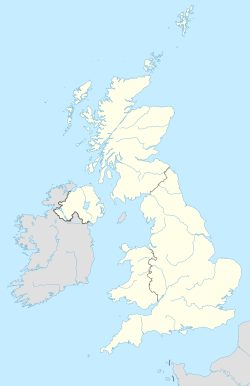RAF Castletown facts for kids
Quick facts for kids RAF Castletown
|
|||||||||||
|---|---|---|---|---|---|---|---|---|---|---|---|
| Castletown, Caithness in Scotland | |||||||||||
|
Shown within Caithness
|
|||||||||||
| Coordinates | 58°34′58″N 003°20′27″W / 58.58278°N 3.34083°W | ||||||||||
| Type | Royal Air Force station | ||||||||||
| Code | AX | ||||||||||
| Site information | |||||||||||
| Owner | Air Ministry | ||||||||||
| Operator | Royal Air Force | ||||||||||
| Controlled by | RAF Fighter Command * No. 13 Group RAF * No. 14 Group RAF |
||||||||||
| Site history | |||||||||||
| Built | 1939/40 | ||||||||||
| In use | May 1940 – 1945 | ||||||||||
| Battles/wars | European theatre of World War II | ||||||||||
| Events | Battle of Britain & Defence of Scapa Flow | ||||||||||
| Airfield information | |||||||||||
| Elevation | 27 metres (89 ft) AMSL | ||||||||||
|
|||||||||||
Royal Air Force Castletown, or simply RAF Castletown, was a special air base in Scotland. It was used by the Royal Air Force (RAF) during the Second World War. The base was built near Castletown in Caithness. It opened in 1940 and closed in 1945.
At first, RAF Castletown helped protect a very important Royal Navy base called Scapa Flow. Later, it also became a base for air-sea rescue missions. This meant planes from Castletown would help find and save pilots or sailors who were lost at sea. The base closed shortly after the war in Europe ended.
Contents
What Was RAF Castletown?
RAF Castletown was a military airfield, like a special airport for the air force. It was located in the north of Scotland. Its main job was to help defend Britain during World War II.
Why Was it Built? Protecting Scapa Flow
When World War II started, the Royal Navy had a huge base at Scapa Flow. This base was super important for their ships. But there wasn't much air protection nearby. The only airfield was RNAS Hatston, which was a navy base. It didn't have planes there all the time.
So, the Air Ministry (the government department in charge of the RAF) quickly decided to get more airfields. They took over Wick Airport, which became RAF Wick. By September 1939, planes like the Blackburn Skua were already flying patrols from there. But they needed even more protection. That's why they chose a spot near Castletown to build a brand new base: RAF Castletown.
Life at the Base: How it Operated
RAF Castletown officially opened on May 28, 1940. At first, it was a smaller base that worked with RAF Wick. But soon, on June 7, 1940, Castletown became its own important base. It even had its own smaller airfield nearby, called RAF Skitten, which opened later in December 1940.
The first planes to arrive were Hawker Hurricanes from 504 Squadron. This was on June 9, 1940. During the Battle of Britain, Castletown's planes helped protect Scapa Flow. Different squadrons, like 3 Squadron and 232 Squadron, flew from there. Even a navy squadron, 808 FAA Squadron, flew its Fairey Fulmar planes from Castletown for a short time. They were one of only two navy squadrons to join the Battle of Britain.
After the Battle of Britain, the danger of an invasion lessened. But attacks on Scapa Flow still happened. In 1941, a new squadron, 124 Squadron, was formed at Castletown. Their job was to patrol the coast and protect convoys (groups of ships). This continued until 1944.
Air-Sea Rescue Missions
As fewer fighter planes were needed at Castletown, the base took on a new role. It became a center for air-sea rescue. This meant planes and crews were ready to search for and save people in the sea. 282 Squadron was created specifically for this purpose at Castletown in 1943. Later, 278 Squadron took over these duties in 1944.
Protecting the Base on the Ground
The base itself needed protection from enemy attacks. At first, army units guarded the airfield. But from 1942 onwards, a special RAF unit called No. 2816 Squadron RAF Regiment took over these ground defense duties.
The End of an Era
The last squadron of planes left Castletown in 1944. The base slowly started to close down. The very last known aircraft to visit was a Sikorsky Hoverfly helicopter in March 1945. Soon after, RAF Castletown closed its doors for good.
 | Selma Burke |
 | Pauline Powell Burns |
 | Frederick J. Brown |
 | Robert Blackburn |



